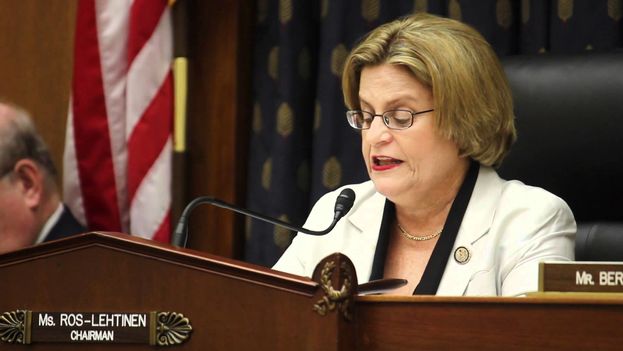
![]() 14ymedio, Pedro Campos, Havana, 29 February 2016 – The Miami press reports that Cuban-born US Congresswoman Ileana Ros-Lehtinen asked Secretary of State John Kerry, during a Congressional hearing, what progress the Cuban government has made, given the many concessions made by the United States, and how does he justify the mass exodus of Cubans that has increased some 80%. At the same time, she requested the extradition of those responsible for the downing of the Brothers to the Rescue planes, and reminded him that since the announcement of rapprochement, there have been more than 8,000 arrests on the island.
14ymedio, Pedro Campos, Havana, 29 February 2016 – The Miami press reports that Cuban-born US Congresswoman Ileana Ros-Lehtinen asked Secretary of State John Kerry, during a Congressional hearing, what progress the Cuban government has made, given the many concessions made by the United States, and how does he justify the mass exodus of Cubans that has increased some 80%. At the same time, she requested the extradition of those responsible for the downing of the Brothers to the Rescue planes, and reminded him that since the announcement of rapprochement, there have been more than 8,000 arrests on the island.
If it were simply a political confrontation between Republicans and Democrats about some aspect of American foreign policy that had no implications for world peace, I would refrain from commenting, but the debate significantly affects the interests of the Cuban people, who Congresswoman Ros-Lehtinen has always prided herself on representing.
Her questions to the Secretary of State are evidence of what everyone knows: she does not share the essence, the basis of the new policy of the Obama administration and, to try to discredit it, presents its measures as “concessions” to the Cuban government that has not done nothing to deserve them.
This is the great original error on which she bases her questions, because the new policy is not conceived as a give and take, but rather as a way to eliminate in the medium and long term the barriers that prevent the Cuban people from exercising their sovereignty for themselves, without foreign interference.
I have always believed that the policy of blockades and pressure against the Cuban government by Unites States affected the Cuban people first and not their rulers, and managed to put the ruling bureaucracy in the role of victims; in short, it has been used to try to justify disastrous economic, repressive and undemocratic policies and, ultimately, has affected the needs of the people themselves, because the bureaucracy has never lacked for anything.
Some defend this mess saying that once the Cuban people begin to starve they will rise up against the government. There is nothing more to say about that.
I am among those who are happy with the change of US policy toward Cuba, since its implementation will make it clear that the rulers have been the perpetrators who have sacrificed the Cuban people for their state-centric policies – supposedly socialist – and it will do away with all these justifications; there will be no way to continue imposing the current control over the economy, politics, the press, culture, education, public health, or of preventing the Cuban people from taking into their own hands the sovereignty that is theirs by right.
There is no defense of the socialism-that-never-was, primarily responsible for the current national disaster, without recognizing that the policy of the embargo-blockade has been its fundamental source of international support. Remove this girder and watch it collapse. But it seems that the Cuban-born congresswoman, in her attempts to discredit Obama the Democrat, does not adequately evaluate his policy toward Cuba.
This shift is intended to take effect in the medium and long term, passing from acceptance of the current Cuban government and having as its principal basis something that those who imposed and maintained the blockade-embargo never intended: it is we Cubans ourselves who have to fix this mess and not the policies of some foreign power. Interference only serves to encourage the Cuban people’s uniting behind the most vulgar nationalism/anti-imperialism.
The congresswoman’s questions are based on false premises. If the idea is to question the policy, go to the bases of it and not to some supposed effects that no one is proposing over the short term.
Perhaps she herself and the Cuban-American caucus in the United States Congress, which has opposed President Obama’s call to end the blockade-embargo, could provide some of the answers to these questions. Meanwhile, the blockade-embargo continues to be an indirect support to economic and political centralization. It prevents the empowerment of Cubans and stimulates mass exodus and arrests, while proposals to end the Cuban Adjustment Act support and encourage internal groups who are for confrontation and not for dialog.
Republicans have every right to try to defeat the Democrats, but they do not have the right to do so at the expense of the Cuban people.
